Table of Contents
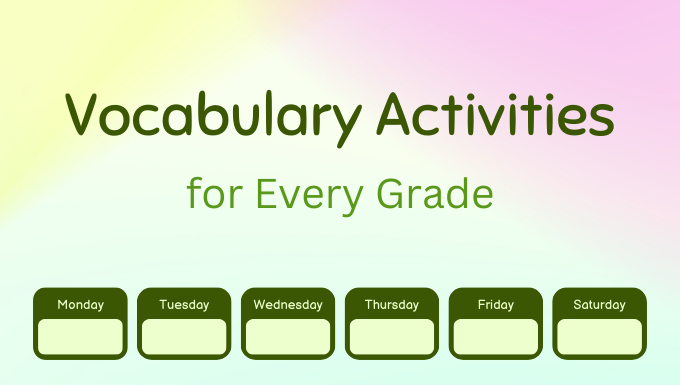
This article is all about finding fun and effective ways to help students of all ages learn new words. We have different activities for each grade to make sure they’re just right for the students’ age and skills. Younger kids get to play with picture cards and simple games, while older students dive into more challenging tasks like word puzzles and preparing for big tests like the SAT. The goal is to make learning new words interesting and useful for everyone, from kindergarteners to high school seniors.
The Importance of Vocabulary Development
Having a strong vocabulary, which means knowing lots of words, is really, really important. It helps us talk to others, understand what we read, and do well in school and work. In this guide, we’ll explain why having a good vocabulary is a big deal.
Vocabulary Activities for All Grades
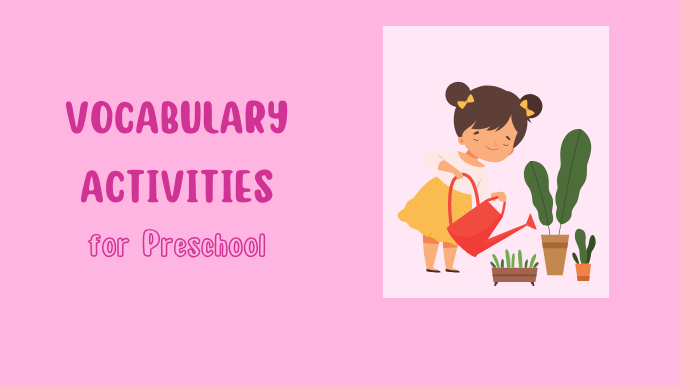
Vocabulary Activities for Preschool (Ages 3-4)
- Picture Word Match: Children match words with corresponding pictures, enhancing word recognition and comprehension.
- Storybook Journey: Read aloud from picture books and pause to discuss new words, encouraging curiosity about language.
- Object Naming Games: Present various objects and encourage children to name them, fostering vocabulary and speech development.
- Sound Matching: Use games that focus on matching words with the same beginning sounds, introducing the concept of phonics.
- Sensory Word Exploration: Engage children in activities that involve touch, taste, smell, sight, and hearing to describe different experiences.
- Simple Rhyme Time: Introduce simple rhymes and songs, emphasizing rhythm and repetition to aid memory and word recognition.
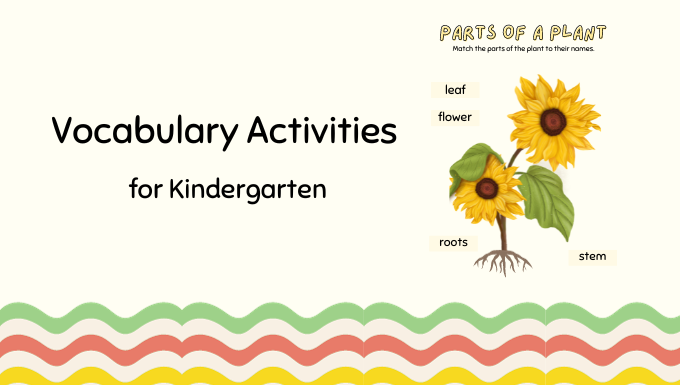
Vocabulary Activities for Kindergarten (Ages 5-6)
- Alphabet Soup: Children create words using alphabet letters, enhancing letter recognition and basic spelling skills.
- Word Bingo: Play bingo using simple sight words to improve word recognition in a fun, group setting.
- Label the Room: Label common objects in the classroom and encourage children to match spoken words to these labels.
- Story Time Word Hunt: Identify new words during storytime and use visual aids to explain their meanings.
- Word Family Trees: Group words that share common endings or sounds, introducing the concept of word families.
- Flashcard Fun: Use flashcards to introduce new words, incorporating visuals and simple definitions.
For preschool and kindergarten students, ages 3 to 6, vocabulary activities should be interactive, engaging, and aligned with their developmental stage.
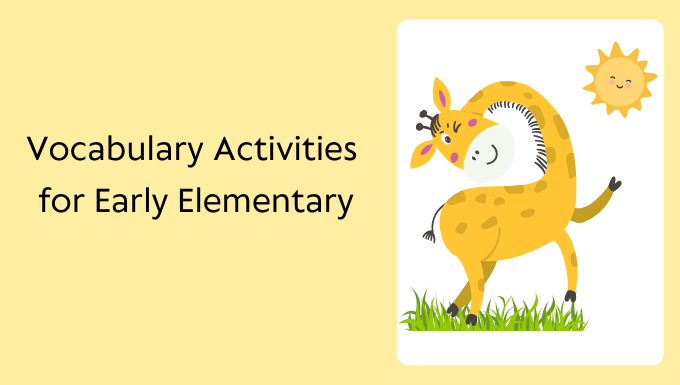
Vocabulary Activities for Early Elementary (Grades 1):
- Word Bingo: Create bingo cards with simple vocabulary words. This game helps with word recognition and is a fun group activity.
- Picture-Word Match-Up: Pair words with corresponding pictures to reinforce word meanings and enhance visual learning.
- Story Building: Encourage students to create stories using a set of new vocabulary words, fostering creativity and context understanding.
- Word of the Day: Introduce a new word each day and encourage its use in spoken and written sentences.
- Word Family Trees: Create visual representations of words that share common endings, such as “-at” or “-an,” to teach patterns in spelling and sounds.
- Flashcard Fun: Use flashcards for quick, interactive games that reinforce new words and their meanings.
Vocabulary Activities for Early Elementary (Grades 2):
- Vocabulary Journal: Students keep a personal journal of new words, their meanings, and an example sentence.
- Word Detective: Assign a ‘word detective’ role where students find new words in their reading and report them to the class.
- Synonym Match: Create matching games where students pair words with similar meanings, enhancing their understanding of synonyms.
- Word Creation Station: Experiment with creating new words using prefixes and suffixes, introducing basic word formation concepts.
- Alphabetical Order Challenge: Organize vocabulary words in alphabetical order, aiding in dictionary skills.
- Role-Play Conversations: Use new vocabulary in scripted or impromptu dialogues, practicing word usage in context.
Vocabulary Activities for Early Elementary (Grades 3):
- Crossword Puzzles and Word Searches: Develop these puzzles using the vocabulary words, which helps in word recognition and spelling.
- Compound Word Exploration: Explore how combining two words creates new meanings, enhancing understanding of compound words.
- Antonym and Synonym Hunt: Identify antonyms and synonyms for vocabulary words, which aids in understanding word relationships.
- Vocabulary Skits: Create short skits or plays using a list of vocabulary words, promoting creative usage of language.
- Context Clue Challenge: Use sentences with missing words and have students fill in the blanks using context clues.
- Word Sorting: Sort words into different categories (nouns, verbs, adjectives, etc.), helping with parts of speech recognition.
For early elementary students in grades 1 to 3, vocabulary activities should focus on expanding basic vocabulary, understanding word meanings, and beginning to explore word usage in various contexts.
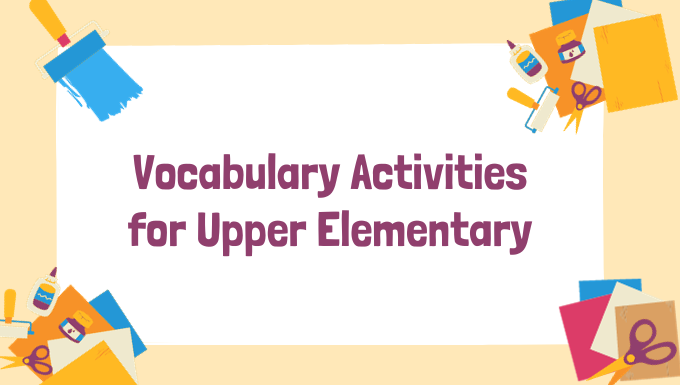
Vocabulary Activities for Upper Elementary (Grades 4):
- Context Clues Exploration: Use sentence examples to decipher the meaning of new vocabulary words, enhancing comprehension skills.
- Word Sort: Categorize words based on their parts of speech, meanings, or themes, which aids in understanding word functions and relationships.
- Vocabulary Skits: Students create and perform short skits using a set of new vocabulary words, encouraging creative language use.
- Synonym and Antonym Journals: Maintain journals where students record synonyms and antonyms for their vocabulary words, deepening their understanding of word relationships.
- Word Origin Study: Explore the etymology of words to understand their origins and how meanings have evolved, which can be intriguing and informative.
- Creative Writing Prompts: Use vocabulary words in creative writing assignments, reinforcing word usage in diverse contexts.
Vocabulary Activities for Upper Elementary (Grades 5):
- Word Wall Activities: Utilize a classroom word wall for interactive games and challenges, like word matching and storytelling using wall words.
- Vocabulary Comics: Create comic strips incorporating new vocabulary, which blends visual arts with language learning.
- Thesaurus Hunt: Use a thesaurus to find synonyms and antonyms, teaching students about word variety and nuances in meanings.
- Root Word Exploration: Focus on learning root words and how different prefixes and suffixes change their meanings.
- Debate with Vocabulary: Organize debates on various topics using specific vocabulary lists, promoting the use of new words in persuasive contexts.
- Vocabulary Bingo: A more advanced version of bingo using more complex words, which is both educational and fun.
Vocabulary Activities for Upper Elementary (Grades 6):
- Vocabulary in Context: Analyze the use of words in different texts, such as stories, articles, or poems.
- Word Association Games: Link words together based on associations or themes, which promotes critical thinking and language connections.
- Vocabulary-Based Puzzles: Create or solve crosswords, word searches, and other puzzles using vocabulary words.
- Literary Vocabulary Analysis: Explore and discuss the vocabulary used in literature, understanding its impact on narratives and themes.
- Group Storytelling: Engage in group storytelling activities where each student contributes by adding sentences using specific vocabulary words.
- Word Portfolios: Create portfolios where students collect, use, and reflect on their vocabulary words, including written pieces, art, or other creative expressions.
For upper elementary students in grades 4 to 6, vocabulary activities should aim to deepen their understanding of language, expand their word usage, and enhance their ability to decipher meanings in various contexts.
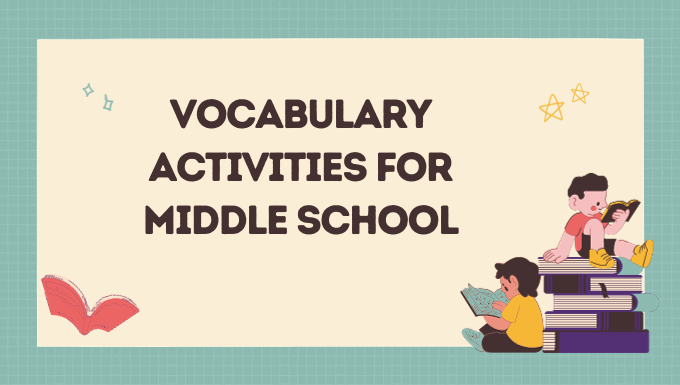
Vocabulary Activities for Middle School (Grades 7):
- Vocabulary in Context: Analyze the use of vocabulary in different texts, such as novels, essays, or articles. Students can discuss how the context influences the meaning of the words.
- Root Word Exploration: Delve deeper into the roots, prefixes, and suffixes of words to understand how words are constructed and how their meanings are formed.
- Synonym and Antonym Challenges: Create games or quizzes where students identify synonyms and antonyms for given words, enhancing their understanding of word relationships.
- Creative Writing Assignments: Use specific vocabulary lists in creative writing tasks, encouraging students to incorporate new words in their narratives or essays creatively.
- Debate and Persuasion: Engage in debates or persuasive writing using assigned vocabulary, which helps in understanding and using words in argumentative contexts.
- Word Association Networks: Create visual maps linking words by associations, synonyms, antonyms, or thematic connections, fostering critical thinking about language.
Vocabulary Activities for Middle School (Grades 8):
- Vocabulary Journaling: Maintain a detailed vocabulary journal where students not only write definitions but also create sentences and note their encounters with the words in reading or daily life.
- Literary Analysis: Conduct in-depth analysis of the vocabulary used in literary pieces, exploring how specific word choices affect tone, mood, and themes.
- SAT/ACT Prep: Introduce vocabulary that is commonly found in college entrance exams like the SAT or ACT, preparing students for future academic challenges.
- Idiomatic Expressions: Explore idiomatic expressions and phrases, discussing their meanings and origins.
- Multimedia Presentations: Have students create presentations using vocabulary words, where they can use images, audio, or video to depict the words’ meanings and uses.
- Group Word Games: Engage in word-based games like Scrabble, Boggle, or word charades in groups, which can be both fun and educational.
For middle school students in grades 7 to 8, vocabulary activities should challenge their growing language skills and encourage critical thinking and application in diverse contexts.
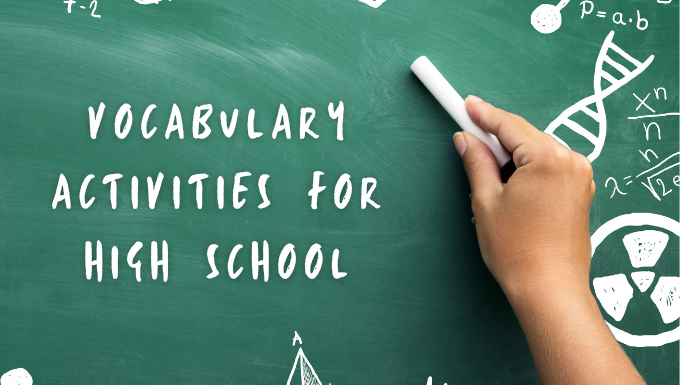
Vocabulary Activities for High School (Grades 9):
- Advanced Vocabulary Journals: Keep detailed journals where students explore words’ meanings, origins, synonyms, antonyms, and use them in original sentences or short paragraphs.
- Literary Vocabulary Analysis: Analyze the use of vocabulary in literary texts, discussing how specific words contribute to themes, character development, and narrative style.
- SAT/ACT Vocabulary Prep: Focus on words commonly found on college entrance exams, using them in various writing and speaking activities.
- Debates Using Targeted Vocabulary: Organize debates on current issues where students must use specific vocabulary words, enhancing their persuasive language skills.
- Creative Writing Challenges: Write poems, short stories, or essays incorporating a list of challenging vocabulary words.
- Word Etymology Exploration: Research the etymology of words and present findings, understanding how word meanings have evolved over time.
Vocabulary Activities for High School (Grades 10):
- Thematic Vocabulary Projects: Create projects where students explore vocabulary related to specific themes (e.g., science, history, art) and present their findings.
- Vocabulary in Media Analysis: Analyze the use of vocabulary in various media formats, such as news articles, editorials, or documentaries.
- Multimedia Vocabulary Presentations: Create presentations using vocabulary words, where students use images, audio, or video clips to enhance understanding.
- Group Word Games: Engage in sophisticated word games like ‘Taboo’ or ‘Balderdash’ that challenge students to think creatively about word usage.
- Advanced Synonym and Antonym Exploration: Dive deeper into the nuances of synonyms and antonyms, discussing how slight differences in word choice can alter meanings and connotations.
- Contextual Vocabulary Usage: Focus on using vocabulary words correctly in different contexts, such as formal writing, casual conversation, or technical descriptions.
Vocabulary Activities for High School (Grades 11 an 12):
- Academic and Professional Vocabulary Building: Concentrate on vocabulary relevant to academic research and professional fields of interest.
- Critical Literary and Textual Analysis: Use advanced vocabulary in analyzing complex texts, exploring how language shapes understanding and interpretation.
- College Application and Essay Writing: Incorporate advanced vocabulary in writing college application essays, personal statements, and scholarship applications.
- Public Speaking and Presentation Skills: Use sophisticated vocabulary in oral presentations and public speaking exercises.
- Vocabulary in World Languages: For students learning foreign languages, focus on building vocabulary in those languages, enhancing their linguistic skills.
- Vocabulary Blogging or Podcasting: Create blogs or podcasts where students discuss and explore new words, their meanings, and usage in various contexts.
For high school students in grades 9 to 12, vocabulary activities should be sophisticated and challenging, aimed at not only expanding their vocabulary but also enhancing their ability to analyze and use words in complex contexts.

Vocabulary Activities for College and Beyond:
For college students and adults, vocabulary activities should focus on advanced language skills, professional development, and practical application in real-world scenarios. Here are some activities suitable for this audience:
College Students
- Academic Vocabulary Enhancement: Focus on discipline-specific vocabulary, especially for students in specialized fields like law, medicine, engineering, or humanities.
- Professional Jargon and Terminology: Learn and use vocabulary specific to various professions, which is crucial for career preparation and professional communication.
- Research Paper Writing: Develop vocabulary through the process of writing research papers, learning to use technical and academic terms appropriately.
- Multilingual Vocabulary Expansion: For students studying foreign languages, emphasize advanced vocabulary acquisition in those languages.
- Public Speaking and Presentation Skills: Incorporate advanced vocabulary into oral presentations, debates, and public speaking exercises, enhancing eloquence and persuasive skills.
- Critical Reading and Discussion Groups: Participate in reading groups or seminars where complex texts are analyzed and discussed, requiring the understanding and usage of sophisticated vocabulary.
Adults and Professional Development
- Industry-Specific Language Learning: For professionals, focus on industry-specific vocabulary to stay current in one’s field and understand evolving terminology.
- Networking and Communication Skills Workshops: Use workshops to practice professional vocabulary in networking scenarios, presentations, and meetings.
- Professional Writing Skills: Enhance vocabulary through professional writing, including reports, proposals, emails, and business communication.
- Language Learning for Global Communication: For adults learning a new language, focus on building vocabulary that’s useful for travel, cultural understanding, or international business.
- Book Clubs and Discussion Groups: Participate in book clubs or discussion groups that focus on varied genres, encouraging vocabulary expansion and critical thinking.
- Online Courses and Webinars: Utilize online resources to learn and integrate new vocabulary, especially in fast-evolving fields like technology, science, and digital media.
Lifelong Learning
- Vocabulary Building Apps and Games: Use technology-based solutions like apps and online games for continuous vocabulary improvement.
- Creative Writing: Engage in creative writing exercises, such as poetry, short stories, or blogging, to explore and use new words.
- Journaling and Personal Reflection: Maintain a personal journal or diary where new words and expressions are used in context.
- Community Education Classes: Attend classes or workshops that focus on language development, writing skills, or specific areas of interest.
- TED Talks and Educational Podcasts: Listen to educational talks and podcasts, noting and researching unfamiliar vocabulary.
- Social Media Engagement: Participate in online forums, social media groups, or discussion boards focused on specific interests or professional topics, using and encountering diverse vocabulary.
These activities are geared toward continuous language development and are applicable in various contexts, from academic settings to professional environments and personal growth. They encourage lifelong learning and adaptation to evolving language use in different spheres of life.